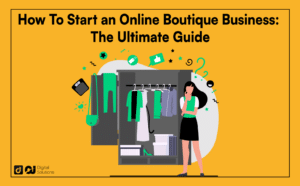Are you thinking, ‘I want to start a business but have no ideas’?
You’re not alone. I’ve been there, too, and many successful entrepreneurs today have faced and overcome this same problem at the beginning.
If you don’t know where or how to start your own business, I can help you.
In this beginner’s guide, I’ll provide various tips to help you develop ideas and turn them into business startups.
I’ll also give you some profitable business ideas anyone can do.
Let’s dive in.
I Want To Start a Business But Have No Ideas: 19+ Ideas To Explore
To get your creative juices flowing, here are some ideas for your new business.
- Virtual assistance services
- Dropshipping
- Blogging or content creation
- Freelance writing
- E-commerce store
- Online coaching or consultancy
- Food truck
- Social media management
- Digital marketing agency
- Home catering or baking
- Pet sitting and dog walking
- Mobile car wash and detailing
- Lawn care or landscaping
- Vending machines
- Airbnb hosting
- Mobile app development
- Event planning services
- Other small business ideas
- Franchising
1- Virtual Assistance Services
As a virtual assistant, you remotely provide administrative, creative, or technical support to businesses and many entrepreneurs.
Your tasks can include responding to emails, scheduling meetings, and organizing your client’s documents. In essence, you’re working as a secretary remotely.
To start, identify your niche, set up a home business, and market your services through online platforms and networking.
2- Dropshipping Business
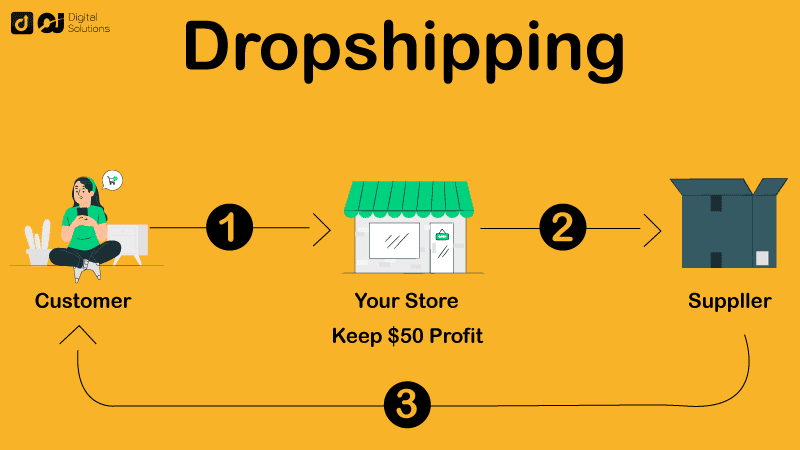
A dropshipping business is an innovative e-commerce model that allows you to sell products without the hassle of inventory management.
You focus on marketing and customer service. Meanwhile, you partner with dropshipping suppliers who handle product storage and shipping.
3- Blogging or Content Creation
Start a blog or a YouTube channel around your passion or expertise. You can easily start with your smartphone and a social media page.
However, you can also create your own website with free website builders like Wix and WordPress.
This business idea has a high potential for passive income and financial freedom. Monetize your content with ads, affiliate marketing, or brand sponsorships.
4- Freelance Writing
With minimal to no initial capital, you can leverage your writing skills and become a become a freelance writer. You can offer your writing services to businesses, blogs, or publications looking for high-quality content.
As a freelance writer, your tasks may involve creating:
- Blog posts
- Articles
- Website content
- Marketing copy
- Social media content
- Product descriptions
To kickstart your freelance writing career, build a portfolio of your best work and set competitive rates.
You can market your services through online platforms like Upwork, Fiverr, or your website.
This is how I got started, and I turned my freelancing business from $0 into a full agency that made over $2M online.
5- E-commerce Store
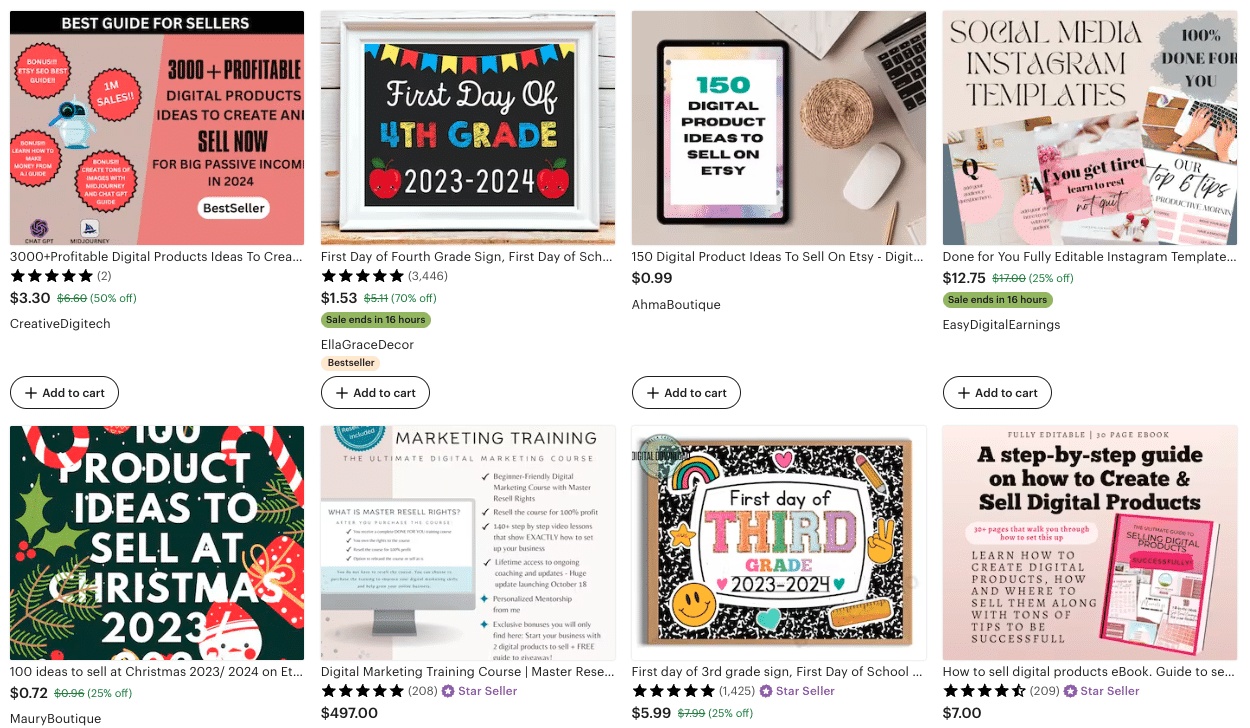
You can start exploring various ecommerce business ideas – from selling digital products like eBooks to offering trendy fashion items.
To start your online business, you must set up an online store through websites like Shopify or WooCommerce. You can also sell on eBay, Amazon, and other online marketplaces.
Then, source the products or create the services you want to sell.
It’s a great option for those with an entrepreneurial spirit, a knack for online marketing, and the ability to curate or create products that resonate with their target audience.
6- Online Coaching or Consulting
Online Coaching or Consulting allows you to share your expertise in a particular field: fitness, life coaching, business marketing strategy, or financial planning.
For example, you can become an online dating consultant that helps clients find a romantic match remotely.
Identify your niche, develop your coaching programs or consulting services, and market your offerings through your website, social media, or coaching platforms.
7- Food Truck
A food truck is a popular choice for entrepreneurs looking to serve delicious meals while remaining mobile.
You can offer food at local events, festivals, or even daily street locations with high foot traffic.
8- Social Media Management
Businesses and influencers often seek experts to manage their social media accounts, create engaging content, and engage with their audience.
To venture into social media management, you must develop a deep understanding of various social media platforms and their audiences.
You must also have excellent communication and content creation skills.
9- Digital Marketing Agency
As businesses increasingly rely on digital marketing, you can create a lucrative business out of this industry.
You can offer SEO, social media marketing, content marketing, and pay-per-click advertising services. Hire a team of graphic designers, copywriters, and other professionals.
If you already have the skills, you only need a laptop and internet connection. However, continuous learning and certifications can help you stand out.
10- Home Catering or Baking
If you have culinary skills and a passion for cooking or baking, consider starting a home cooking or baking business.
You can offer event catering services, prepare homemade meals for busy individuals, or create specialty baked goods.
Here’s a big idea: tap into the growing health and wellness niche if you cook healthy meals.
Note: You must have the proper licenses and certifications related to food handling. You must also set up a professional kitchen with the best hygiene practices.
11- Pet Sitting and Dog Walking
You’ll be responsible for taking care of pets when their owners are away, offering services like:
- Feeding
- Walking
- Companionship
Build a client base through referrals, online platforms, local events, and local meetups.
12- Mobile Car Wash and Detailing
If you want a local business, try capitalizing on the automotive industry.
You must invest in equipment and materials, but the initial costs aren’t high. You can start with basic services, like:
- Exterior and interior cleaning
- Waxing
- Detailing
13- Lawn Care or Landscaping
You can start a lawn care business if you enjoy working outdoors and have a green thumb.
You can offer services like:
- Lawn mowing
- Garden maintenance
- Tree trimming
- Landscape design
You don’t need much equipment at the start as you can start by offering basic services. You can also start with just yourself or with a small team.
14- Vending Machines
Operating vending machines can be a passive income source, and you don’t need any special skills or knowledge to enter this business.
You only need three things: a vending machine, a good location, and initial inventory.
15- Airbnb Hosting
If you have extra space in your home or property, consider becoming an Airbnb host.
Initial costs would include furnishing and preparing the space for guests, but you can work with any budget.
This idea also has the potential to generate passive income, but you’ll have to invest in automating the processes and outsourcing the maintenance tasks.
16- Mobile App Development
Venture into mobile app development if you have a background in software development or coding.
Mobile apps continue to be in high demand, and you can create innovative solutions for businesses or individuals.
Begin by identifying a niche or problem that you can solve through a mobile app.
17- Event Planning Services
You can try offering event planning services if you have excellent communication, organization, and project management skills.
You’ll be able to manage various events, from weddings and corporate gatherings to parties and conferences.
You don’t need much capital to start, although you need a wide network of reliable suppliers.
18- Other Small Business Ideas
Did you know that independent businesses are the backbone of this country?
There are 33.2 million small businesses in the U.S. today, carving a huge contribution in the U.S. economy.
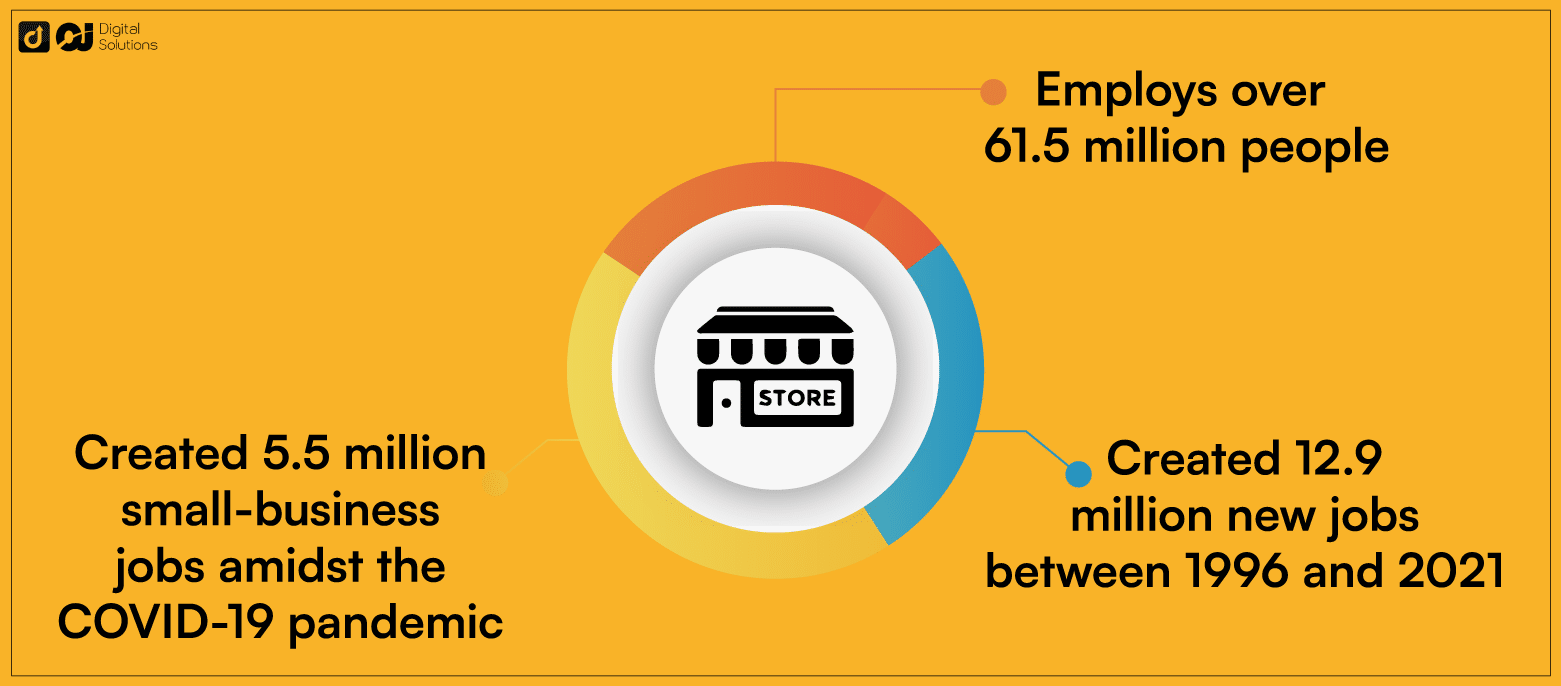
You can do these ideas part-time, allowing you to explore entrepreneurship without sacrificing all your free time.
Here are some small business ideas you can do:
- Handyman
- Sewing and alteration specialist
- Handcrafted and custom items
- Artwork
- Photographer
- Nonprofit
- Coffee shop
19- Franchise Businesses
Becoming a franchisee lets you take advantage of a proven business model. It poses lower risks, and you don’t have to generate your idea.
A franchise business venture allows you to sell a brand’s products and services. You can capitalize on its popularity and ongoing support to propel your new business to success.
However, all these benefits come with a higher price. You still have some tasks, such as finding a good location, buying equipment, and hiring staff.
Here are some great business franchise ideas.
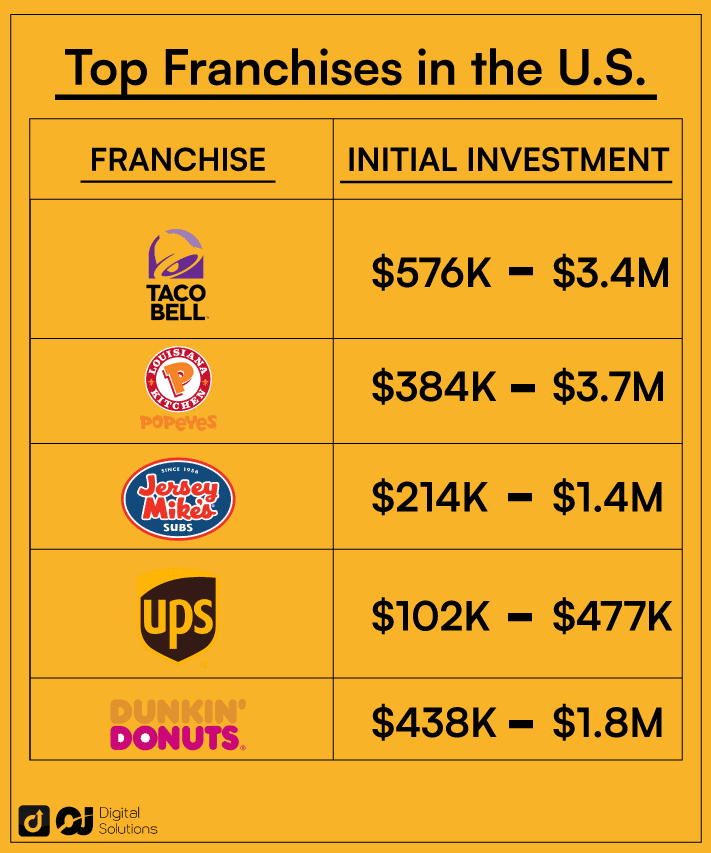
- Fast Food Franchise
If you want to enter the food industry, you can join the big names instead of trying to compete with them.
You can inquire with franchises like McDonald’s, Subway, and Dunkin’ to start.
- Fitness Center
Fitness centers are also increasing in demand as the public grows awareness of health and wellness.
Check out franchise opportunities like Anytime Fitness and Planet Fitness.
- Cleaning Service
This industry also has franchise opportunities for both residential and commercial markets. It has a high potential for huge profits, as you’ll have access to repeat clients.
Brands like Molly Maid and ServiceMaster Clean have established systems for efficient and effective cleaning services.
How To Find the Right Business Idea For You: Step-by-Step
As I had been in this situation in the past, here’s what I did at the start:
- Step 1 – List down all your business ideas.
- Step 2 – Consider which ideas fit your best.
- Step 3 – Determine your financial goals.
- Step 4 – Understand your market.
- Step 5 – Test your product or service idea.
- Step 6 – Turn your idea into a business.
- Step 7 – Keep an entrepreneurial mindset.
Let’s take a look at each step in more detail.
Step 1 – List Down All Your Business Ideas.
First, come up with as many ideas as you can, and make a list of potential businesses owned that resonate with you.
Don’t worry about having a long list; you’ll shave it down later.
Aside from the business ideas above, here are some tips to help you generate new ideas.
Think About Common Problems.
Good business ideas often come from aiming to solve problems.
Start by looking at your own experiences and the challenges you’ve encountered.
Have you recently sought a product or service you couldn’t find in the market?
Chances are, others have faced the same issues.
Use these pain points as inspiration for your first business.
Familiarize Yourself with Different Niches.
To discover the right business idea, explore various niches and industries.
Begin by picking one or two niches that pique your interest. For example, you’re deeply interested in the beauty niche.
Conduct further research to answer questions like:
What products are already available? What do customers in this niche want? Are there any gaps in the market that you can fill?
Specializing in a niche allows you to tailor your offerings to a specific audience, increasing your chances of success.
Know Which New Businesses Are Trending.
Keeping an eye on market trends can provide valuable insights into potential business ideas. Review reports and studies from reputable sources like the following:
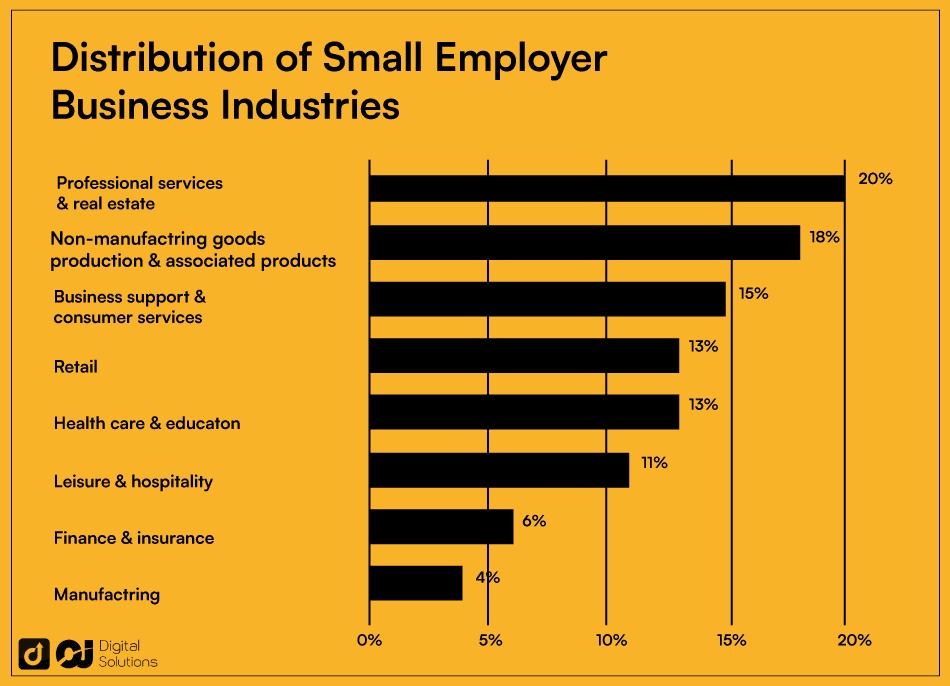
Learn From Other People.
Don’t limit your creative thinking to yourself. Seek input and insights from potential customers and other entrepreneurs through…
- Reading books. Reading can also stimulate your brain and help you generate new ideas.
- Talking to people, even strangers. Everyone can be your business mentor, from friends and family members to experts. They can provide advice and guidance beyond the initial stages of starting a business.
Step 2 – Consider Which Idea Fits You Best.
Once you have a nice list, you can start crossing some items based on your unique needs and preferences.
What Do You Like?
Think about the things you enjoy doing.
Do you enjoy calligraphy? Knitting or crocheting? Talking to people? Freelance writing? Teaching? Shopping?
Any hobby can turn into a new idea.
For example, if you knit or crochet, a good business idea is to sell your creations on online marketplaces like Amazon or Etsy.
Choosing something you’re passionate about will keep you motivated in the long run.
Here are some small business ideas you can start from your hobbies:

- Handcrafting jewelry
- Making scented candles
- Making soap from natural ingredients
- Creating different artwork (painting, drawing, digital art, etc.)
- Photography
- Baking
- Cooking
Do an Inventory of Your Skills.
Sometimes, passion isn’t enough to start a business. In this case, consider your knowledge and skills.
What are you good at?
You can also use your experiences to come up with new business ideas.
For example, if you’ve worked in the food industry and know how to cook, you could start a food-related business like being a food truck owner.
If you’re keen on online businesses, you can instead offer an online course for cooking.
Determine Your Level of Commitment.
In addition to your interests and skills, assess your commitment to each business idea.
Commitment comes in two key aspects:
- Time
Consider how much time you can realistically dedicate to your business. Some ideas may require more time initially for research, development, and marketing, while others might be manageable with your current schedule.
Be honest with yourself about the time you’re willing to invest.
- Difficulty
Evaluate the complexity and difficulty of implementing each idea. Some business concepts may involve intricate processes, extensive market research, or advanced technical skills.
Assess whether you’re prepared to tackle the challenges presented by each idea.
Identify Your Purpose For Starting a Business.
Author and leadership expert Simon Sinek said that people behind inspiring and successful businesses start with their “why.”
Why do you want to start a business?
Is it to achieve financial security, be your own boss, or create employment opportunities for others?
Understanding your purpose will help you stay focused and motivated throughout your entrepreneurial journey.
Step 3 – Determine Your Financial Goals.
Before fully committing to an idea, assess whether you have enough money to fund your business startup.
Knowing these ensures that your chosen venture aligns with your financial goals and the resources available, setting you toward financial success.
Capital and Investment
Assess the financial resources you have available for starting your business. This includes your savings, investments, or any potential loans you can secure.
Consider factors like the following:
- Initial Costs: Calculate the start-up costs, including equipment, inventory, licenses, permits, and necessary technology or infrastructure.
- Ongoing Expenses: Estimate the recurring expenses, such as rent, utilities, employee salaries (if applicable), marketing costs, and maintenance.
- Risk Tolerance: Evaluate your comfort level with financial risk. Some business ideas may require substantial upfront investment with a longer wait for returns, while others have minimal financial risk.
| Business Idea | Initial Costs | Ongoing Expenses | Risk Tolerance |
| Fast Food | High | High | Low |
| Fitness Center | High | High | Medium |
| Cleaning Service | Low | High | Low |
| Mobile Car Wash & Detailing | Low | Low | Low |
| E-commerce Store | Low | Low | Medium |
Income Potential
Examine the income potential of each business idea. Research the market to determine the demand for your product or service.
Researching should also help you develop a pricing strategy that aligns with your target audience and market positioning.
Funding Options
Explore various funding options available to support your business idea, such as:
- Self-Funding
If you have sufficient personal savings, consider self-funding your business. This approach gives you full control but may limit the scale of your venture initially.
- Small Business Loans
Check out loans for small businesses from banks or financial institutions. These loans can provide the capital needed for startup costs and expansion.
- Investors
Seek potential investors, such as angel investors or venture capitalists, who may be interested in funding your business in exchange for equity.
- Crowdfunding
Explore crowdfunding platforms where you can present your business idea to a wide audience and secure financial support from backers.
- Grants and Competitions
Research grants, business competitions, or incubator programs that offer financial support to startups with promising ideas.
Step 4 – Understand Your Market.
Effective market research empowers you to make data-driven decisions across many businesses.
It allows you to refine your business idea, develop strategies to address market demand and outperform competitors.
Check the Competition and Demand.
Start by assessing the competitive landscape in your chosen market.
Identify who your direct and indirect competitors are, evaluate their market share, and study their strengths and weaknesses.
A competitive analysis can help you discover gaps in the market where your business can excel or areas where you can offer unique value.
Additionally, evaluate the demand for your product or service.
Is there a genuine need for what you want to offer?
Analyze all the details – the market trends, consumer behavior, and any seasonal fluctuations that might impact demand.
Define Your Target Audience.
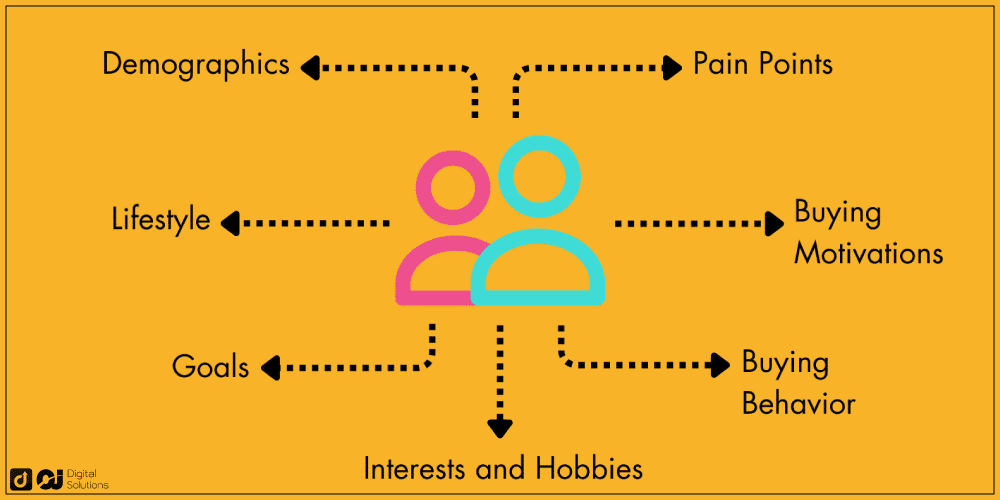
Your target audience will most likely benefit from and engage with your offerings. Develop detailed customer personas by considering the following factors:
- Demographics (age, gender, location)
- Psychographics (values, interests, lifestyles)
- Behavioral patterns (purchasing habits, online activity)
With a well-defined audience, you can tailor your marketing efforts and product development to cater specifically to the needs and preferences of your ideal customers.
Gather Feedback and Build Relationships.
Building strong relationships with your audience is an ongoing process. Actively seek feedback from your potential and existing customer base.
The next time you talk to people, consider them potential customers.
What needs do they have in common? How much are they willing to spend on these particular needs?
Their answers help you decide which ideas are best for starting a business.
Encourage open communication through surveys, focus groups, or direct conversations. Listen to their suggestions, complaints, and compliments to refine your offerings continually.
Step 5 – Test Your Product or Service Idea.
Once you have a business idea, it’s time to test its viability in the market.
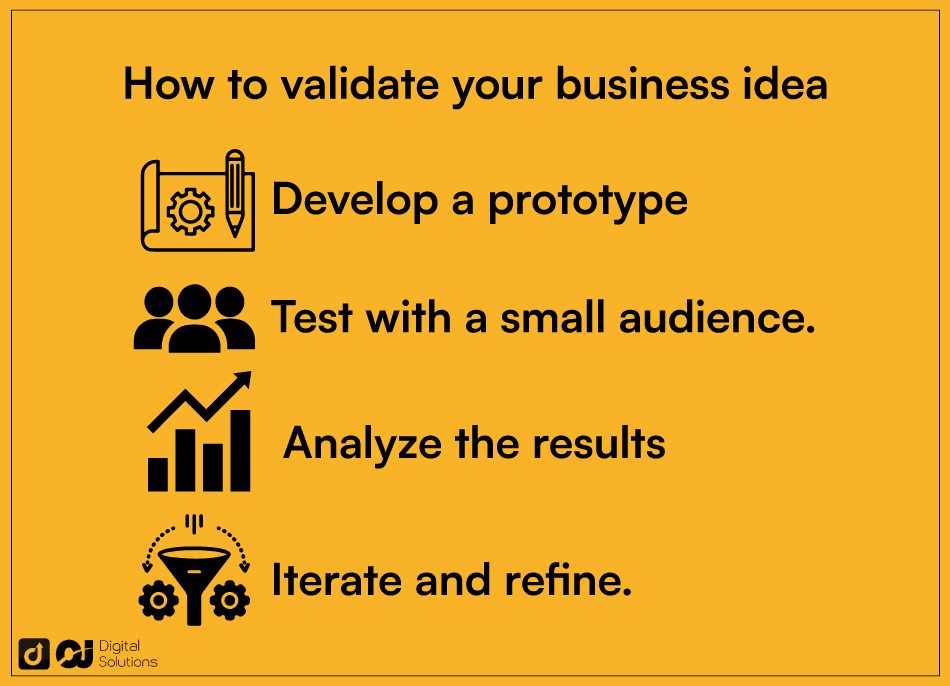
By testing your product or service idea, you reduce the risk of launching something that may not resonate with customers. You can also better understand how to find customers who like your offering.
Develop a Prototype or MVP.
If you’re offering a physical product, develop a prototype or sample. For services, consider offering a limited version of your service as a Minimum Viable Product (MVP).
Create a simplified version of your product or service demonstrating its core functionality.
This model doesn’t have to be a polished final product but should showcase your concept’s value. A prototype allows you to gather initial feedback without wasting time and resources.
Start Small.
Instead of launching on a large scale, begin with a limited, controlled release.
This step could involve offering your product or service to a small group of beta testers or within a specific geographic region.
Starting small lets you identify potential issues and learn important lessons as a business owner.
Analyze the Results.
Carefully analyze the feedback and data collected during the testing phase. Identify areas for improvement and necessary adjustments.
At this point, you must also assess whether your product or service can be produced or delivered at a reasonable cost while maintaining a profitable pricing structure.
Iterate and Refine.
Use the insights gained to make improvements to your product or service. Consider tweaking features, pricing, or marketing strategies based on feedback.
Conduct additional rounds of testing as needed. Continue refining your offering until you’re confident it meets market demands.
Step 6 – Turn Your Idea Into a Business.
Now that you’ve chosen a business idea that resonates with you and your target market, it’s time to transform it into a fully-fledged business.
Here are some tips to get started:
- Develop a comprehensive business plan that outlines your goals, strategies, and financial projections.
- Identify your business model based on your goals and resources.
- Register your business and ensure you comply with all legal requirements.
- Open business checking accounts to keep your business and personal finances separate.
- Create a strong online presence through a website, social media, and marketing efforts.
- Begin offering your products or services to the market.
Step 7 – Keep an Entrepreneur Mindset.
It’s normal to have self-doubt as you begin your entrepreneurial journey, but remember that small successes can build confidence.
It’s okay to start from the bottom and work your way up. Small is how many of today’s largest biggest businesses began, anyway.
Apple began with only Steve Jobs and Steve Wozniak working in Jobs’s garage. Jeff Bezos started Amazon as a small company selling books.

Fast forward to today, and Apple and Amazon are now two of the most well-known companies in the world.
The beauty of starting small is that you initially avoid dealing with expensive overhead costs. You can focus on building your business and making money instead of securing funds from venture capitalists.
There are other benefits to starting small as first-time entrepreneurs.
- You won’t need much time and energy.
- You avoid becoming overwhelmed.
- You feel more motivated and confident when you achieve small goals.
- You’ll find it easier to pivot.
Care About Your Customers and Your Own Business.
To be a successful business owner, you must strive not only to improve your own life but also the lives of others.
When you care about your paying customers, you’re more likely to provide them with what they need.
Satisfied customers are much more likely to give you good reviews and free referrals, enhancing your reputation and boosting your sales.
In addition, keeping an existing customer is way cheaper than finding a new one, lowering your marketing expenses.
Whether you’re looking for ideas for your first or next venture, you should always prioritize your customers.
Don’t Rush.
According to the Bureau of Labor Statistics, 20% of businesses fail during their first year. After five years, almost half of them are closed.
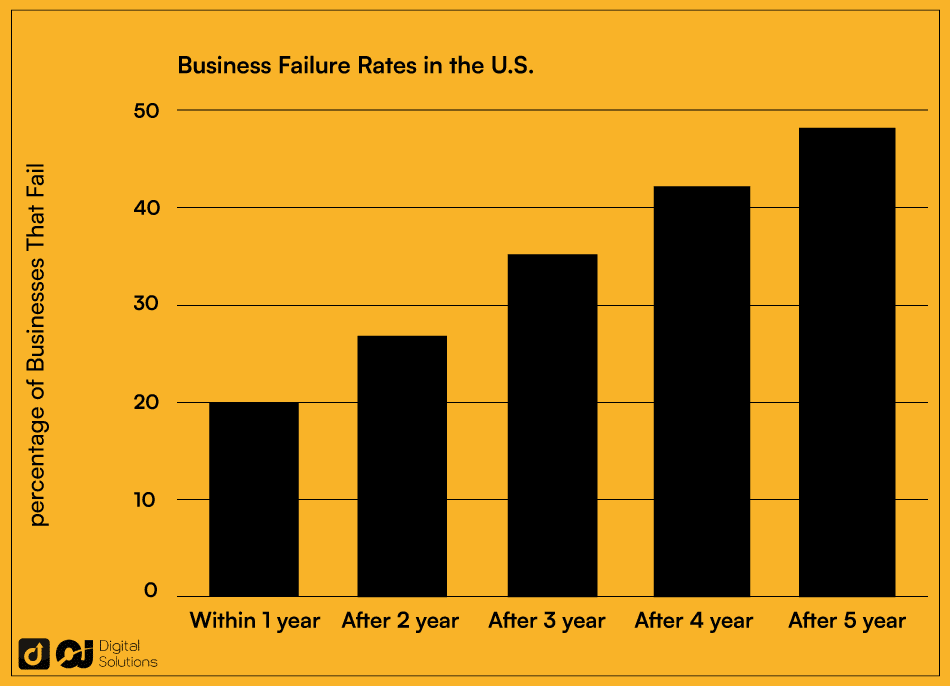
Why?
Misreading the market, hiring the wrong people, and challenges are some of the most common reasons startups fail.
There’s no need to rush because there’s no such thing as overnight success. Most entrepreneurs today take the time to grow their businesses.
Here are some reasons to work towards your business goals slowly but steadily.
- You’re bound to make smarter decisions.
- You’ll have better overall performance.
- You’ll feel more confident.
- You’ll avoid burnout.
- You’ll have a greater appreciation of the rewards.
Take your time to explore and refine your concepts until you find the perfect idea.
The Bottom Line
Becoming an entrepreneur doesn’t happen overnight, but I hope this guide will help you take that plunge.
By doing the steps above, you can turn your entrepreneurial aspirations into a reality, even if you initially had no specific business concept.
What helped me kickstart my career is keeping my goals in sight while being open to adjustments and continuous learning in my personal life – which I believe are some of the most essential traits of every successful entrepreneur, especially when going through tough times.
Ultimately, you’ll experience much growth as soon as you take that first step.



